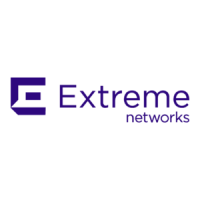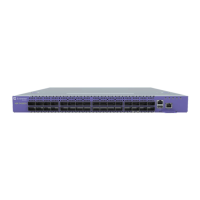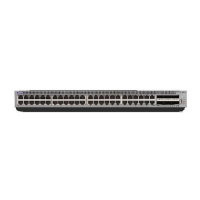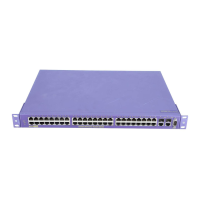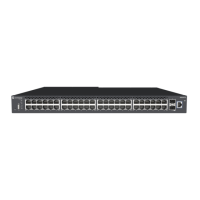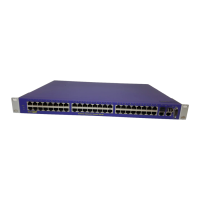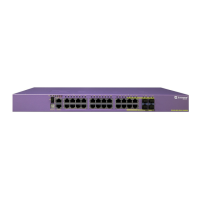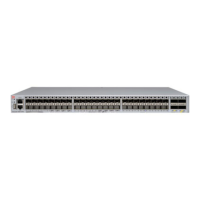Do you have a question about the Extreme Networks 7720 and is the answer not in the manual?
Basic information about the intended reader for the installation guide.
Explains formatting, symbols, and text conventions used throughout the document.
Resources for finding additional product information, documentation, and training.
Contact methods for technical assistance, support portals, and community forums.
Instructions on how to subscribe for product and software release notifications.
How to provide feedback or report issues with the documentation.
Describes the RJ45 serial console and Ethernet management ports for switch configuration.
Details on hot-swappable fan modules and airflow direction for cooling.
Information on available hot-swappable 800W AC or DC power supplies.
Explains stacking ports and how to connect multiple switches for stacked operation.
Describes the secure boot mechanism for validating the boot image integrity.
Specifies the supported operating temperatures based on airflow direction.
Explains unified licensing and methods for acquiring feature licenses.
Lists the different switch models available within the 7720 Series.
Details on configuring QSFP28 ports as single or partitioned ports for data lanes.
How to monitor the boot image verification status using Switch Engine commands.
Guidance on actions to take for secure boot validation failures.
Safety and handling guidelines for power supply modules and their airflow.
Information on 800W AC power supply options, including airflow direction.
Information on 800W DC power supply options, including airflow direction.
Overview of switch stacking, its benefits, and the SummitStack-V feature.
Describes native and alternate stacking methods for creating a switch stack.
Explanation of stack topologies, slot numbers, and primary/backup redundancy.
Recommends a ring topology for connecting stack nodes for normal operation.
Discusses the daisy chain topology and why it is not recommended for normal operation.
Defines key terms and concepts related to SummitStack configurations.
Guidelines for planning the physical setup of switches, VIMs, and cables for a stack.
Instructions on how to enable or disable the stacking-support option on switches.
Best practices for physically situating switches for optimal stacked operation.
Recommendations for configuring software parameters for a new switch stack.
Information on stacking switches from different product series, like 7520 and 7720.
Guidance on choosing the correct stacking cables based on port type and length.
Description of a tool to assist in planning and selecting switch stack configurations.
Step-by-step instructions for physically connecting switches using stacking cables.
Procedures for connecting the switch stack to the management network.
Overview of the site planning process, including meeting requirements.
Verifying that the site meets all environmental and safety requirements.
Importance of complying with building and electrical codes for installation.
Recommendations for preparing the wiring closet for equipment installation.
Ensuring adequate temperature control in the installation area for performance and safety.
Maintaining optimal humidity levels to maximize equipment life and prevent issues.
Measures to protect the system from electrostatic discharge (ESD).
Guidelines for selecting and preparing equipment racks according to standards.
Specific mechanical requirements for equipment racks, including size and mounting.
Procedures for properly grounding equipment racks to earth ground.
Ensuring adequate space around the rack for easy servicing and ventilation.
Steps for securely attaching the rack to the floor to prevent tipping.
Assessing and meeting the site's cabling needs and requirements.
Best practices for implementing a reliable cable labeling system and accurate records.
Guidelines and best practices for installing network cables correctly.
Safety precautions and handling instructions for fiber optic cables.
Information on compatible cable types and maximum transmission distances.
Recommendations for selecting RJ45 connector jacket types to ensure proper fit.
Precautions to take to avoid radio frequency (RF) interference during installation.
General requirements and precautions for powering the network hardware.
Specific power requirements for connecting Power over Ethernet (PoE) devices.
Recommendations for planning and making power supply connections for equipment.
Information on selecting and purchasing appropriate power cords for the equipment.
Guidelines for selecting and using Uninterruptible Power Supply (UPS) devices.
How to determine the required UPS size based on equipment power needs.
Importance of UPS transition time for stacking products and minimizing service interruptions.
Importance of following applicable industry standards for installation and cabling.
Crucial safety information and warnings before attempting switch installation.
List of necessary tools, equipment, and personnel for switch installation.
Procedures for mounting the switch into a standard 19-inch equipment rack.
Detailed instructions for mounting the switch using a four-post rack-mount kit.
Instructions for mounting the switch in a two-post rack using specific brackets.
Steps for installing optional components like transceivers and cables.
Guidance on installing one or two internal power supply units into the switch.
Steps for powering up the switch after installation and component setup.
How to connect network interface cables to the switch ports.
Steps to establish a console connection for switch monitoring and configuration.
Procedure for the first-time login to the switch using the Switch Engine OS.
How to assign an IP address and subnet mask for the management VLAN.
Procedure to change the switch operating system using the bootloader menu.
Procedure to change the switch operating system via the startup menu.
Procedure for the first-time login to the switch using the Fabric Engine OS.
Instructions for replacing internal power supply units while the switch is operating.
Detailed steps for removing and installing an 800W AC internal power supply.
Detailed steps for removing and installing an 800W DC internal power supply.
Instructions for replacing fan modules in the switch.
General procedures for removing the switch from a rack.
Specific steps to remove the switch from a four-post rack mount.
Specific steps to remove the switch from a two-post rack mount.
Description of system status LEDs on the switch front panel and their meanings.
Explanation of the LED indicators for the RJ-45 management port.
Description of the LED indicators for the QSFP28 ports.
Explanation of the LED status indicators for the 800W AC power supply units.
Explanation of the LED status indicators for the 800W DC power supply units.
General technical overview and specifications for the 7720 Series switches.
Details on the types and number of ports and connectors on the switch.
Physical specifications for accessories like fan units and rack-mount kits.
Specifications related to the switch's acoustic noise level and fan speed.
Details on the switch's processor, memory, and storage components.
Mean Time Between Failures (MTBF) data for different 7720 Series switch models.
Technical specifications for the 800W AC and DC power supply units.
Power consumption information for the 7720 Series switches in various modes.
Information on power usage and heat dissipation for the Extreme 7720 switches.
Specifications for storage, transportation, and operational environmental conditions.
Compliance with environmental regulations such as EU RoHS and WEEE.
Specific limits for temperature, humidity, and altitude during operation.
Conditions for packaging and storing the equipment to maintain integrity.
List of applicable safety, electrical, and networking standards for the equipment.
Electromagnetic compatibility standards the device complies with.
Standards related to network media access, such as 1000BASE-T and 10GBASE-X.
Requirements for selecting and using AC power cords with switches and power supplies.
Pinout details for the DB-9 and RJ45 console connectors.
Preliminary items to consider before starting equipment installation.
General safety guidelines and practices for handling network equipment.
Safety precautions to follow when performing maintenance on equipment.
Safety warnings related to laser radiation from fiber optic ports and modules.
Guidelines for routing LAN system cables within and between buildings.
Instructions for installing power supply units and connecting them to power sources.
Information on choosing and purchasing appropriate power supply cords.
Important notice regarding the product's internal battery and replacement.
Specific battery warning and disposal information for the Taiwan region.
Declaration of conformity with relevant European Council directives and standards.
Warnings related to electromagnetic interference and compliance.
Specific warning statement related to China Compulsory Certification (CQC).
Information regarding Restriction of Hazardous Substances (RoHS) in China and Taiwan.
Specific statement required for Bureau of Standards, Metrology and Inspection (BSMI) in Taiwan.
Compliance information for Canadian Interference-Causing Equipment Regulations.
Statement related to China Compulsory Certification (CCC) for electrical products.
Information regarding Australian Radiocommunications Compliance Mark (RCM).
FCC compliance statement indicating adherence to Part 15 rules.
Statement regarding machine noise information regulation in Germany.
Statement for Korea Communications Commission (KCC) certification.
Statement regarding VCCI Class A compliance for equipment used in domestic environments.
Specific warning regarding the use of power cords packed with equipment for Japan.
| Jumbo Frame Support | Up to 9216 bytes |
|---|---|
| Operating Temperature | 32°F to 104°F (0°C to 40°C) |
| Storage Temperature | -40°F to 158°F (-40°C to 70°C) |
| AC Input Voltage | 100-240 VAC |
| Type | Switch |
| Power Supply | Dual, hot-swappable power supplies |
| AC Input Frequency | 50/60 Hz |
